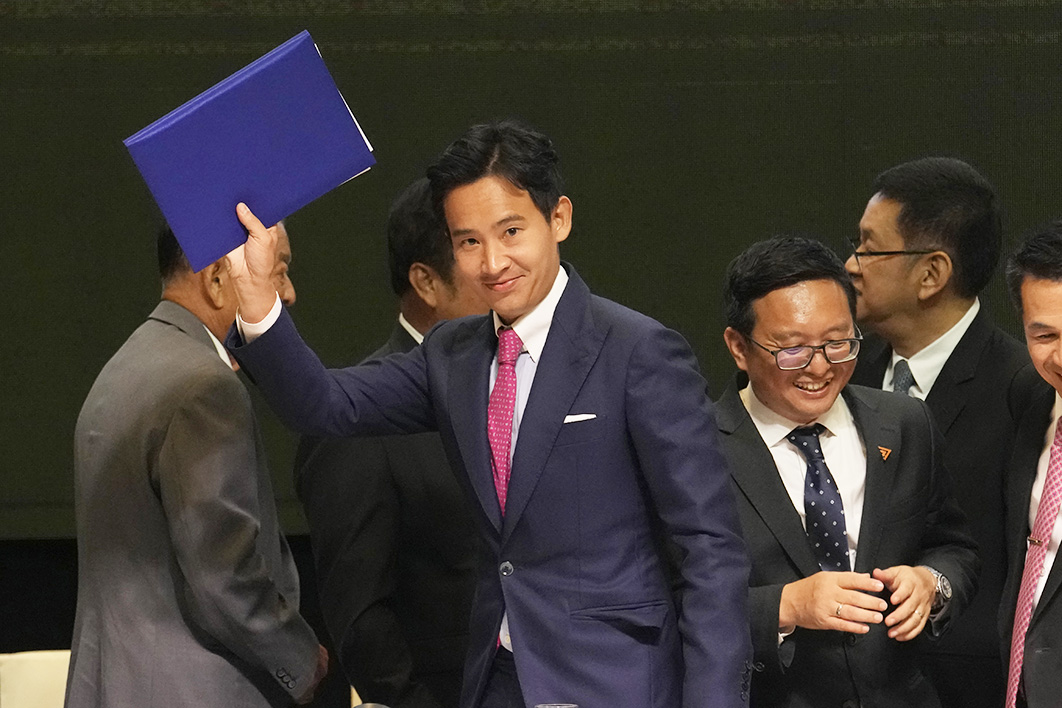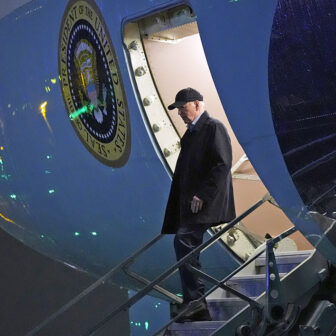It’s an exquisite irony. One of the more appealing scenarios for Thailand’s generals following this month’s election is to form a coalition with the party they deposed in the 2014 military coup.
That fact alone sums up the futility of the Thai establishment’s two-decade effort to suppress wishes expressed by Thai voters at elections in 2001, 2005, 2007, 2011 and 2019. Each time, populist parties backed by former prime minister Thaksin Shinawatra were the biggest winners thanks largely to the support of voters from Thailand’s populous rural northeast.
Because the opposition Democrat Party couldn’t win elections in this notionally two-party system, conservatives resorted to dissolving Thaksin’s parties in 2007, 2008 and 2019, or staging military coups in 2006 and 2014. They did so because Thaksin’s rapid ascent to power and electoral popularity threatened Thailand’s patrimonial power structures and the establishment’s vested interests and privileges.
Now, though — despite the benefits they gain from an undemocratic post-coup constitution adopted in 2017 — Thailand’s conservatives face a bigger threat than Thaksin ever posed. The biggest winner in this month’s election was not Thaksin’s Pheu Thai party, but newcomer Move Forward, a party contesting only its second election.
Move Forward’s agenda is radical for Thailand. It seeks wholesale democratic reform to limit the military’s role in politics, an end to military conscription, reform of the lèse-majesté law that prohibits criticism of the monarch, and changes to Thailand’s hierarchical and outmoded education system. Its leaders, including prime ministerial hopeful Pita Limjaroenrat, are young, dynamic and often internationally educated, and frequently have a background in business.
Rather than just appealing to young people, Move Forward has attracted support from across different demographics in Thailand’s urban areas. It swept all but one of Bangkok’s thirty-three electorates, gaining 42 per cent of the vote there, and performed strongly in other urban centres — even including traditional Pheu Thai strongholds such as Chiang Mai in the country’s north.
For the establishment, these gains suggest troubling times indeed. The military-backed government, meanwhile, fielded two proxy parties at the election, both of which were trounced.
Yet conservatives still have live options if they wish to prevent Move Forward from taking power. The 2017 constitution allows 250 military-appointed senators to vote on the prime minister, meaning that any coalition will need a super-majority of 376 votes in the lower house to ensure their preferred candidate gets the job. So far, the Move Forward–Pheu Thai coalition has secured around 315 votes for Pita, a strong majority in any normal democracy but perhaps not enough in Thailand.
If Pita does secure sufficient support, perhaps from more independent-minded senators, he still risks being banned from politics or having his party dissolved. Thailand’s referee institutions — the Constitutional Court, Election Commission and National Anti-Corruption Commission — have a history of acting against popular politicians.
Either of these options would only be a temporary fix for the political establishment. The dissolution of Move Forward’s predecessor party in 2020 led to protracted youth-led protests on Bangkok’s streets, many of which attracted tens of thousands of demonstrators. This time, sympathy for the military is even thinner on the ground. Heavy-handed steps against Move Forward are likely to attract a significant backlash.
Perhaps more importantly, Thailand’s big businesses and corporate conglomerates wouldn’t necessarily support the military. The Thai Chamber of Commerce, for example, has already said that a transition to a younger generation of leaders isn’t necessarily a bad thing, and that political stability was important.
They are undoubtedly concerned by the state of the economy. Over nearly a decade, prime minister Prayut Chan-o-cha has failed to lead any meaningful economic reform. Thailand has lagged Vietnam and other neighbours in attracting investment. It hasn’t participated in the Comprehensive and Progressive Agreement for Trans-Pacific Partnership and other trade deals. Long-term challenges, including an underperforming education system and an ageing society, haven’t been tackled in any meaningful way.
Move Forward’s and Pheu Thai’s leaders say they want to do things differently. Their leaders include successful figures who understand the need for Thailand to adapt to the changing global and regional economy. Pita is one of them — he is a former executive director of technology business Grab Thailand — and his predecessor as party leader was vice-president of Thailand’s largest automotive parts business. Pheu Thai’s Srettha Thavisin was a real estate mogul before entering politics.
Another area where Move Forward could quickly make a mark is the crisis in neighbouring Myanmar. Since a coup there in 2021, the country has slid ever more deeply into civil war. With close ties between the two countries’ militaries, Thailand has been reluctant to criticise the Myanmar junta or support tougher action within ASEAN. Thailand has even undermined ASEAN unity on this issue by giving the junta a platform at sub-regional diplomatic dialogues and meetings.
Move Forward has already flagged that it would approach Myanmar differently. Following the election, Pita foreshadowed a humanitarian corridor to provide assistance to the people of Myanmar. A Move Forward government also seems likely to engage with opposition groups in the country, as advocated by Indonesia and other countries in the region.
Relations with the United States would probably also improve. Although dealings have long been normalised since the 2014 coup, little love has been lost between the two notional treaty allies. The Biden administration’s framing of the world as democracies versus autocracies was always going to sit uncomfortably for a Thai government that had its roots in a military coup. By contrast, Move Forward and the Harvard-educated Pita are likely to see Washington as broadly sympathetic to their aims.
If Thailand’s establishment decides not to respect the result of this election, the future for the country will look very different. In this scenario, Pheu Thai might decide to ditch Move Forward and join forces with smaller conservative parties, but the resulting coalition would have little ideological or policy coherence. As has happened under the outgoing government, each party would seek lucrative ministries in order to dispense largesse to would-be voters.
Even if the country didn’t face international isolation for this sub-democratic outcome, the absence of impetus for domestic reform or regional leadership would make Thailand increasingly irrelevant to its international partners.
Pheu Thai itself would likely be punished by voters in future elections. (One of the reasons for its electoral underperformance in 2023 may have been the rumour that it would join forces with the military.) Support for Move Forward would grow stronger and Thai politics would become even more polarised. The risk of political conflict and violence would rise.
While the battle between Thailand’s popular and establishment forces is far from over, this election looks to be an inflection point. If the establishment can recognise the futility of its efforts to subvert democracy and allow this one to stand, Thailand may finally move a step closer to the stable democratic system its people deserve. But if they choose once again to intervene and confound the outcome, the country risks a political impasse more intractable than any it has faced before. •




